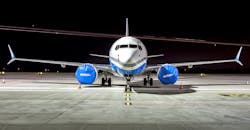737 MAX Recertified, but Congress Wants a Stricter FAA
As the Federal Aviation Administration was moving to restore air-worthiness certification to Boeing’s 737 MAX aircraft, the U.S. House of Representatives unanimously approved legislation to reform the agency’s aircraft certification process. Later, a Senate committee advanced comparable legislation.
Both bills aim to strengthen the FAA’s authority over aircraft production programs, and sources reported that the two houses would work to finalize a version for passage before the end of 2020
The 737 MAX was grounded in March 2019 after the second of two crashes that killed 346 passengers and crew members. While Boeing worked with FAA and safety authorities elsewhere in the world to determine and correct the cause of the crashes, the process revealed disputes between the manufacturer and the FAA over allegations that the agency deferred too much to Boeing’s pressure to certify the then-new 737 in 2017.
By rescinding its grounding order, FAA is indicating that Boeing may resume deliveries of the 737 MAX passenger jets, and that airlines may begin the process of updating their aircraft with the new flight-control software, retraining crews on the system, and resuming commercial service with the twin-engine jets.
In September, an inquiry by the U.S. House Committee on Transportation and Infrastructure led to a report that blamed both crashes on a series of design mistakes in the 737 MAX, as well as failure by the Federal Aviation Administration to properly oversee the aircraft's certification process.
“Our intent (with the new legislation) is to ensure a U.S.-manufactured airplane never again crashes due to design issues or regulatory failures,” according to committee chairman Peter DeFazio, as quoted by Reuters.
The new House bill will require a panel of experts to evaluate Boeing’s “safety culture” and recommend improvements. It further requires aircraft manufacturers to adopt safety management systems and complete system safety assessments for aircraft design changes.
Going further, it requires that risk calculations be based on realistic assumptions of pilot response time, and that risk assessments are shared with regulators.
The Senate Commerce Committee approved a bill that would endow the FAA with new authority over manufacturers in the established practice of delegating some certification tasks to employees of those companies. The FAA contends that Boeing pressured its own workers delegated such certification tasks during the 737 MAX initial approval sequence.
